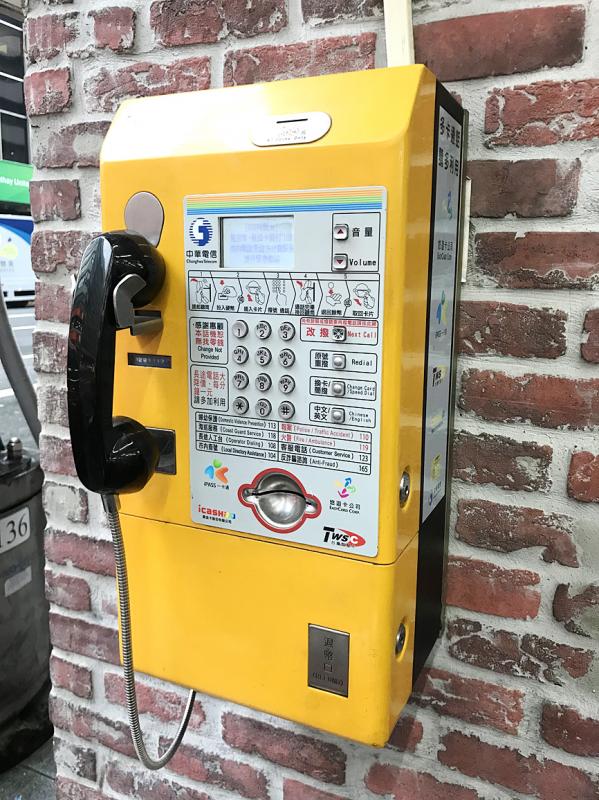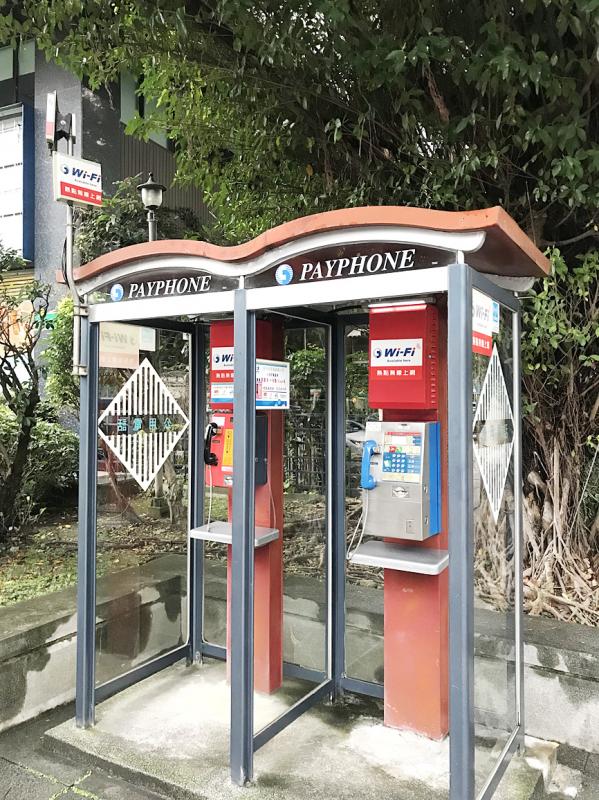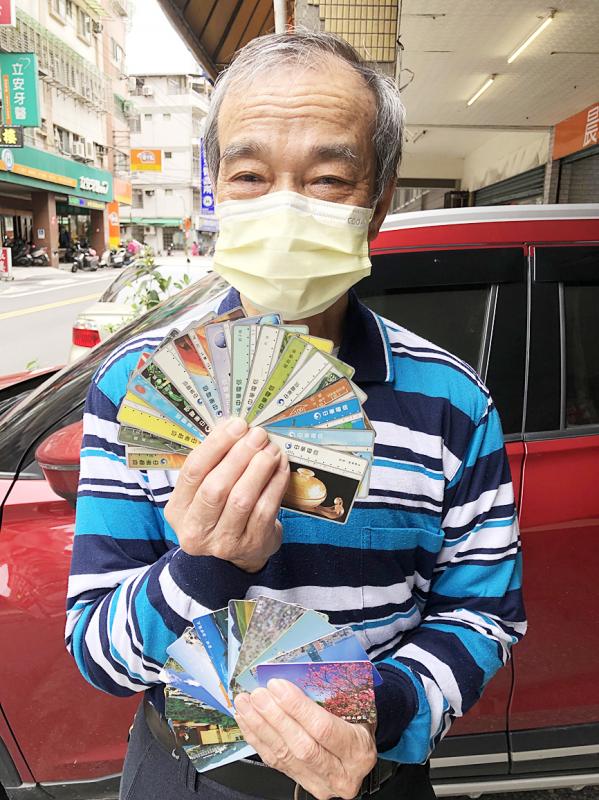The prevalence of cellphones and mobile coverage nationwide has caused most payphones to disappear from public places.
In 1999, payphones were at their peak in Taiwan, with 150,000 of them nationwide contributing a record NT$8.6 billion (US$300.56 million at the current exchange rate) from prepaid and stored-value phone cards, the National Communications Commission (NCC) said.
Last year, the nation had 36,000 payphones, the commission said.

Photo: Yang Mien-chieh, Taipei Times
An NCC report shows that Taiwan’s first public payphone was installed in 1947, while the biggest wave of installations happened in 1981, when the government ran a nationwide campaign with the slogan: “A telephone in every village.”
As mobile coverage has spread and more people have switched to cellphones, telecoms have cut operating costs by gradually removing payphones, an 80 percent decline from 1999 to last year, NCC data showed.
From 1999 to last year, payphone revenue fell 98 percent to NT$110 million, the data showed.

Photo: Yang Mien-chieh, Taipei Times
For example, payphones in Taichung have declined from a high of more than 10,000 phones to fewer than 1,000. The city’s densest concentration of payphones, at more than 400, is at the Chenggong Ling (成功嶺) military training base.
Before a local COVID-19 outbreak in May last year, each payphone at Chenggong Ling took in about NT$300 to NT$400 per month, with some taking in more than NT$1,000, NCC Vice Chairman Wong Po-tsung (翁柏宗) said.
“Although public payphone use is declining, we must still make them available to the public, because government policy is to serve rural regions and villages, and to uphold the rights of those who cannot afford a cellphone,” he said.

Photo: Yang Mien-chieh, Taipei Times
“To provide all of society with telephone access, we provide subsidies to telecoms so that rural regions have two payphones within a 200m radius and other areas have one payphone per 2km2,” he added.
The commission said that it subsidizes payphones that do not generate revenue at each primary and secondary school, hospital, railway and bus station, and mountainous area, as the public must be provided access to phone service.
In 2020, the subsidies totaled NT$87 million, it added.
Wong said that 4G coverage nationwide is 99 percent, including in rural regions.
“For example, Chunghwa Telecom offers 98.54 percent 4G coverage in rural regions and 91.24 percent 5G coverage,” Wong said.
“We will require all telecoms to expand 5G coverage and quality nationwide. Right now, we are pushing for online connection via satellite systems to resolve signal reception issues in rural regions and outlying islands,” Wong added.
Prepaid phone card sales have declined from 11.67 million cards sold for NT$2.34 billion in 2000 to 48,0000 cards sold for NT$68 million last year, a decline of more than 80 percent, NCC data showed.
Prepaid phone card collector Yang Tzu-tsai (楊子才) said he began collecting when he was young.
Yang said he would scavenge the greater Taipei area for cards that people had not bothered to retrieve from the payphone after making their call.
“My collection is of cards that Chunghwa Telecom produced for its payphones,” Yang said.
“Most of the cards have prints of unique Taiwanese architecture, like Taipei 101 and the Presidential Office Building,” he said.
Some people would collect cards with prints of natural attractions or festivals, such as the Orange Daylily Festival at Hualien County’s Lioushihdanshan (六 十石山) or the Alishan Cherry Blossom Festival, while others collected those with famous museum exhibit pieces or cultural events, such as the Donggang Boat-Burning Ceremony in Pingtung County.
Telephone booths were popular spots at most barracks, Yang said, adding that in the 1950s and 1960s, men had to do two or three years of mandatory military service, depending on their unit.
“A prepaid phone card was a must for young men in the military. Families would send cards to their sons and some local governments would hand them out as gifts,” he said.
Many stories were told of young men waiting in long payphone line to call their girlfriends, he said.
Additional reporting by Jason Pan

POSITIVE DEVELOPMENT: Japan and the US are expected to hold in-depth discussions on Taiwan-related issues during the meeting next month, Japanese sources said The holding of a Japan-US leaders’ meeting ahead of US President Donald Trump’s visit to China is positive news for Taiwan, former Japan-Taiwan Exchange Association representative Hiroyasu Izumi said yesterday. After the Liberal Democratic Party’s landslide victory in Japan’s House of Representatives election, Japanese Prime Minister Sanae Takaichi is scheduled to visit the US next month, where she is to meet with Trump ahead of the US president’s planned visit to China from March 31 to April 2 for a meeting with Chinese President Xi Jinping (習近平). Japan and the US are expected to hold in-depth discussions on Taiwan-related issues during the

‘LIKE-MINDED PARTNER’: Tako van Popta said it would be inappropriate to delay signing the deal with Taiwan because of China, adding he would promote the issue Canadian senators have stressed Taiwan’s importance for international trade and expressed enthusiasm for ensuring the Taiwan-Canada trade cooperation framework agreement is implemented this year. Representative to Canada Harry Tseng (曾厚仁) in an interview with the Central News Agency (CNA) said he was increasingly uneasy about Ottawa’s delays in signing the agreement, especially as Ottawa has warmed toward Beijing. There are “no negotiations left. Not only [is it] initialed, we have three versions of the text ready: English, French and Mandarin,” Tseng said. “That tells you how close we are to the final signature.” Tseng said that he hoped Canadian Prime Minister Mark Carney

President William Lai (賴清德) yesterday bestowed one of Taiwan’s highest honors on Saint Vincent and the Grenadines (SVG) Ambassador Andrea Clare Bowman in recognition of her contributions to bilateral ties. “By conferring the Order of Brilliant Star with Grand Cordon on Ambassador Bowman today, I want to sincerely thank her, on behalf of the Taiwanese people, for her outstanding contribution to deepening diplomatic ties between Taiwan and SVG,” Lai said at a ceremony held at the Presidential Office in Taipei. He noted that Bowman became SVG’s first ambassador to Taiwan in 2019 and

A man walks past elementary school artworks at the Taipei Lantern Festival in Ximen District yesterday, the first day of the event. The festival is to run from 5pm to 10pm through March 15.